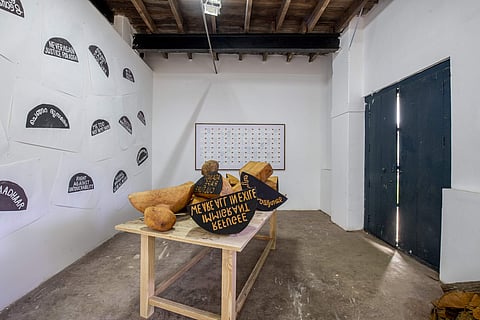
- LIFESTYLE
- FASHION
- FOOD
- ENTERTAINMENT
- EVENTS
- CULTURE
- VIDEOS
- WEB STORIES
- GALLERIES
- GADGETS
- CAR & BIKE
- SOCIETY
- TRAVEL
- NORTH EAST
- INDULGE CONNECT

Barthélémy Toguo from Cameroon, born in 1967, cut quite the superhero figure, dressed in bright overalls and armed with a power chainsaw, hacking away at timber to construct his installation, in the days leading up to the Biennale.
The artist, who was recently conferred the titles of Knight in the Order of Arts and Literature, and Chevalier des Arts et Lettres, France arrived in Kochi earlier this October, to begin setting up his work for the festival.
Barthélémy, who was also shortlisted for the Prix Marcel Duchamp in 2016, maintains a fairly multi-disciplinary oeuvre, with works ranging from paintings, installations and performances to video, photography, ceramics and even wood carving.
At the Biennale, the artist offers his overview of a greater purpose: “The role of art is to open the door to other cultures of the world, and to bring visitors to discover other worlds.” For his own works, Barthélémy is consumed by concerns over issues of immigration and exile.
“Human mobility represents incredible difficulty in contemporary society,” he explains. “The young dreadfully languish under the yoke of laws related to the borders, and humanity should look a little more closely at how this plagues people.”
Earlier, at an edition in the Let’s Talk series of artist presentations at the Kochi-Muziris Biennale, Barthélémy urged that cultural activists should persevere to make the grassroots mission a success.
“I live in Paris and also Bandjoun (a town in the West Region of Cameroon). I have noticed that anything new to one’s culture is widely seen with suspicion and prejudice in both urban and rural areas,” he related.
In a personal initiative, Barthélémy went on to establish Bandjoun Station, a centre for exchange between local and international artists, including an exhibition space, a library and plantations in Bandjoun, in 2007.
However, initially, the locals were not welcoming, he points out. “Even today, some continue to think the art centre is basically for the White.” Gradually, they began hosting local traditions and rituals associated with weddings and funerals, helping him gain the confidence of people and develop their curiosity about art.
In Kochi, the artist observes, “It is a Biennale that has been very open in the various mediums, and their diversity contributes to the good quality of the Biennale. The organisation of biennials and festivals of this size makes art accessible to a wide audience.”
He adds, “This is a young biennale, and it is open to the international world. It has already built a good reputation, I think the team is on a good track, and it will make constructive changes.”
Expectedly, nature happens to be an important part of Barthélémy’s efforts to nurture different forms of art, even promoting vegetable farming in a big way while providing residencies for visual artists, at his centre in Bandjoun.
Barthélémy is quick to dispel misconceptions about political motivations. “Contemporary art must not be of a political, activist or even intellectual nature to have a great impact,” he asserts. “But the artist has the right to express himself on everything he feels.”
The task at hand is to take the work to the people. “Art evolves quickly, and in this environment, current technological developments are taken into account to interest the younger generation,” he explains.
Barthélémy is also showing at The Musée d’Art Contemporain du Val-de-Marne (MAC/VAL) in Vitry-sur-Seine, Paris until 24 February. At KMB, his works are on display at Pepper House, until March 29.